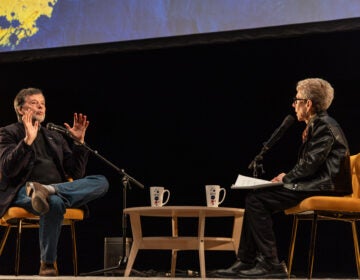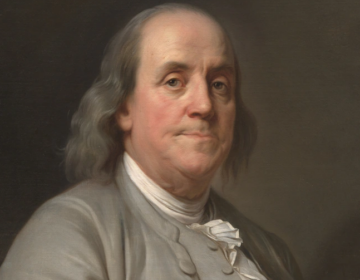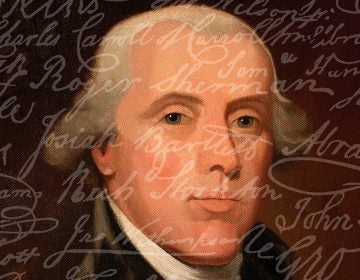American Revolution libraries to merge into one historical powerhouse
The David Library in Bucks County, Pa., will move into Center City to become part of the American Philosophical Society.

Norval Reece, treasurer of the board of trustees of the David Library, holds a box of mircofim from the collection, which contains about a million pages of original material from the Revolutionary War era preserved on microfilm. He is joined by chief operating officer Meg McSweeney and acting librarian Andrew Zellers-Frederick. (Emma Lee/WHYY)
Any history book about the American Revolution worth its salt will likely include an acknowledgment of the David Library, a historical archive tucked into 118-acres of green rolling hills in Washington Crossing, Pa.
“The David Library is this incredible gem in Bucks County,” said Scott Stephenson, the CEO of the Museum of the American Revolution. As a scholar and curator, he has spent countless hours pouring over documents at the David.
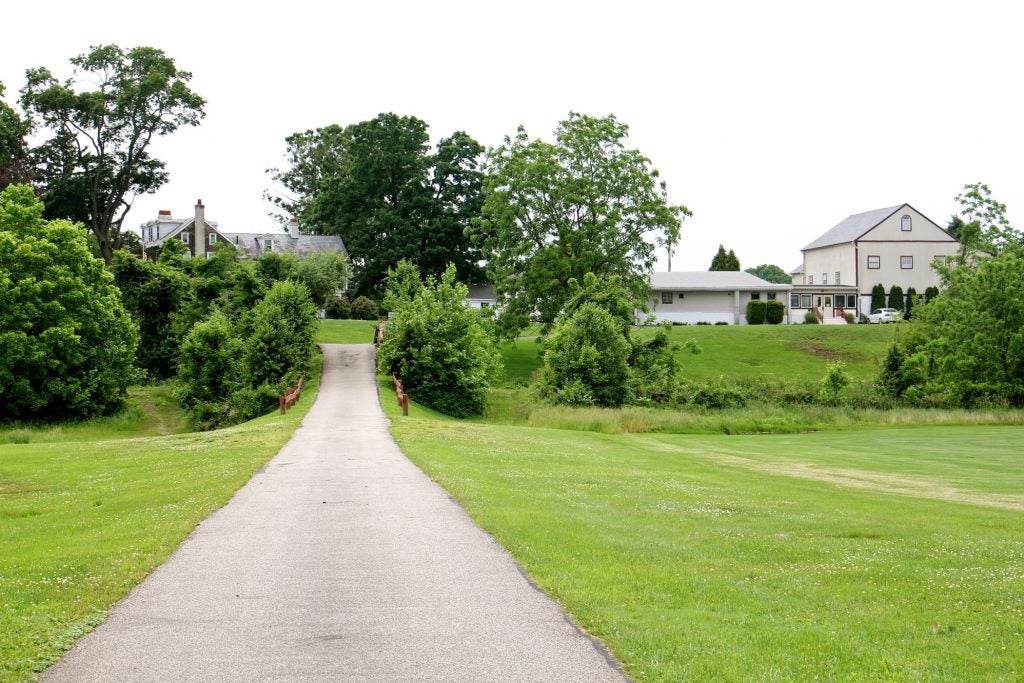
There are 10,000 reels of microfilm at the David, containing about a million documents related to the American Revolution.
Stephenson is happy to hear that the David will soon be his neighbor in Old City. At the end of this year, the library will leave its bucolic setting and join the American Philosophical Society, which is around the corner from Independence Hall.
Stephenson said it will be an academic “force multiplier” for making the city a center for research.

“On the eve of the 250th anniversary of the signing of the Declaration of Independence, coming in just seven years, the timing couldn’t be better for this,” Stephenson said.
The library was founded 60 years ago by Sol Feinstone, a collector of historic manuscripts who amassed about 3,000 original documents related to the American Revolution, mostly correspondence of the Founding Fathers. He named his library after his grandson, who has developmental disabilities.

Since then the library has collected 10,000 reels of microfilm, containing images of about one million original documents from American, British, and German archives.
The original Feinstone farmhouse is now used as a residence for visiting fellows – researchers who are invited to live there for a period of a few weeks. The house can host five in its furnished rooms just as Feinstone family had, a kind of bed and breakfast for scholars.
The property also has a handful of residential homes for semi-permanent tenants. Much of the estate is protected by an agricultural easement, now leased by a sod farmer.
Even with rental income, upkeep of the library is difficult, said chief operations officer Meg McSweeney.
“A lot of old buildings, a lot of land, a lot of parking lot and lanes that need repair, trees come down in stormy weather,” she said. “A lot of things that have nothing to do with scholarship.”
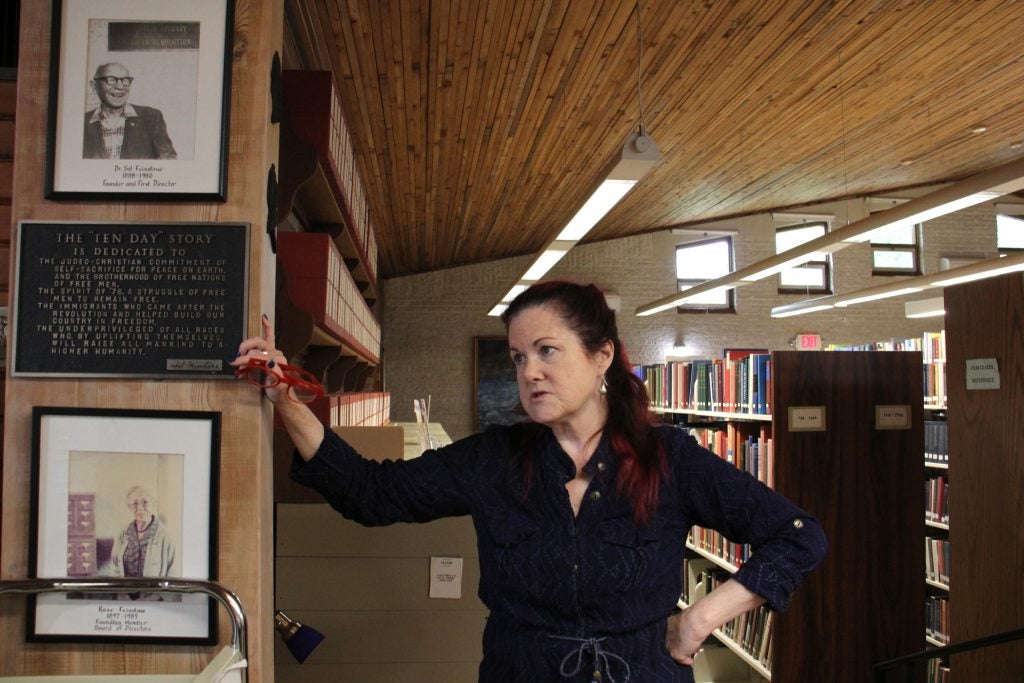
The library is also on the cusp of becoming obsolete. The majority of its holdings are on microfilm. The technology needed to store, monitor and print microfilm imagery are becoming harder to maintain. The cost of digitizing the collection is far beyond the library’s means.
“This decision took three years,” said board treasurer Norval Reece, about moving to Philadelphia. “There’s a lot of emotion attached to Bucks County. We love Bucks County. But if we looked hard at the mission of the David Library, this made all the best sense.”
“Personally, it’s going to be a challenge,” said longtime volunteer David Swain, a retired historian who drives to the library once a week from a nearby retirement community to spend hours reading and cataloguing microfilm documents. The move to Philadelphia will likely end his relationship with the library.
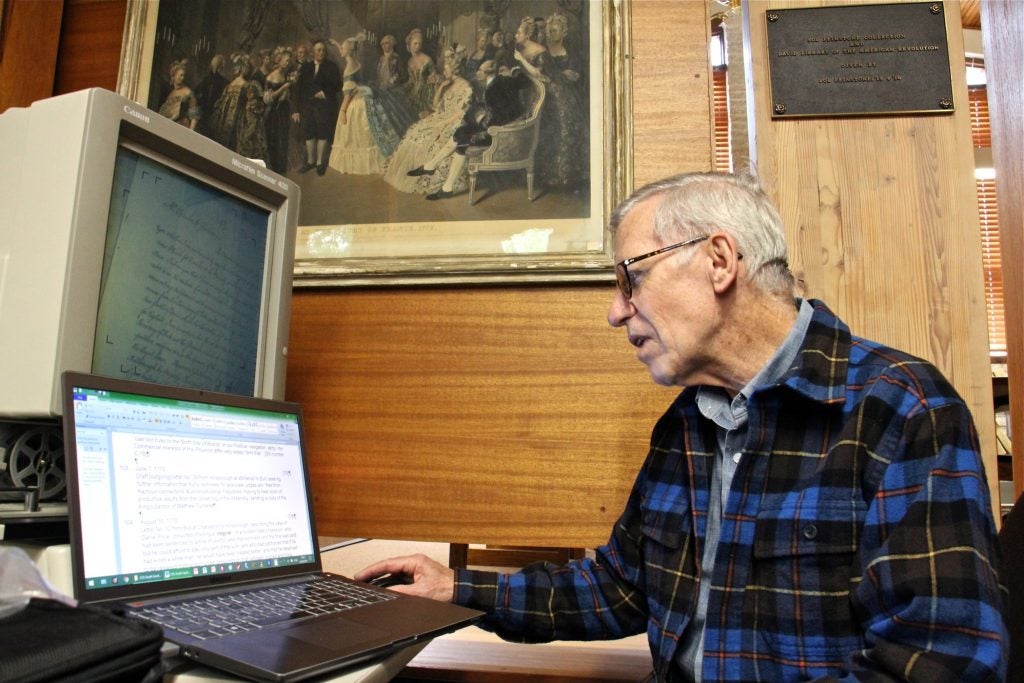
“I think perhaps Bucks County is going to have to look around and say, ‘Oh, we don’t want to lose more like the David,” he said. “It’s a valuable resource we have had here in Bucks.”
McSweeney said the 118-acre property will likely be sold and that income will be added to the library’s endowment, although the plan for that is yet to be determined by the board.
Once in Philadelphia, the David Library will become the David Center for the American Revolution at the American Philosophical Society. It will retain its own board and its own endowment, although it will not keep its own staff of three full-time employees and one part-time.
The American Philosophical Society predates the American Revolution. It was established in 1743 by a group of colonists – including Ben Franklin — to “promote useful knowledge.” In its 276 years, it has amassed its own historical collection, focusing on the Revolutionary era, science and medical history, and Native American languages.
With the addition of the David Library material, and in proximity to Philadelphia’s other historical institutions, APS should become a magnet for American Revolution research.

“By combining our two collections we will have the premiere location of such material in the United States,” said Robert Hauser, CEO of the Philosophical Society. “We will be the only major research center devoted to that.”
The David Library receives about 500 visitors a year, including researchers and audiences for its scheduled lecture series. By comparison, the American Philosophical Society, with its curated exhibition space and location at the center of a major history tourism destination, receives about 130,000 visitors annually.
WHYY is your source for fact-based, in-depth journalism and information. As a nonprofit organization, we rely on financial support from readers like you. Please give today.



